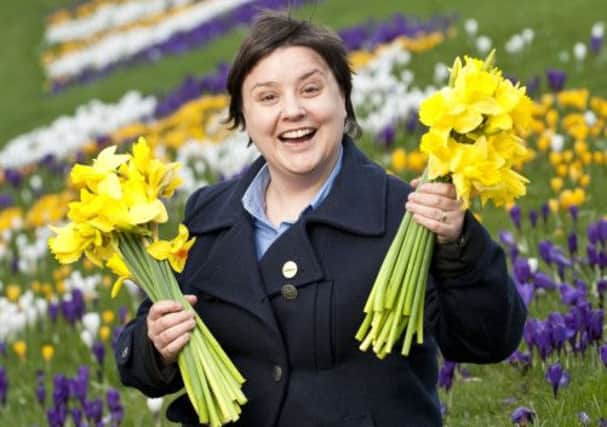Arts blog: Lyceumgate | Calmangate | Gatefold Sleeves


Should they now add the new season at Edinburgh’s Royal Lyceum Theatre to this list? As Stef Smith, (female) writer of the multi-award-winning show Roadkill, pointed out on Twitter yesterday, “I don’t want to party-poop but I am alarmed that there isn’t a single female writer or director in the seven shows for the Lyceum 2013/14”.
Smith has not been alone in saying this, and she has a point. While the Lyceum’s new season promises much to enjoy – not least the prospect of Ian Rankin’s first stage play (book early for that one) – women are, so far, conspicuous by their absence.
Advertisement
Hide AdThe Lyceum’s artistic director, Mark Thomson, is understandably prickly about what he regards as this “rather kneejerk reaction”. “I do think the Tweeting culture rather forgets context, and here’s the context,” he says, pointing out that, last year, three of the Lyceum’s seven shows were written by women, all had an actress in the lead role (six do this year too), and, perhaps most significantly in terms of future productions, all five assistant directors were female. “I’ve tried to encourage the development of young female directors as much as I can,” says Thomson. “The last four on my own productions were all women.”
This does, of course, raise the question of why Thomson still has to admit that the “overwhelming number of passionate pitches” this year were from men. “That’s a much longer conversation,” he says. But in the meantime he has two suggestions: firstly, that people wait until the full creative teams are assembled (“directors and playwrights tend to be the first announced”) and secondly that someone takes the time to look at gender balance at theatres across the whole of the UK, before passing judgement on one of them. Fair enough.
Calmangate
FOR poking fun at the independence debate on Radio 4’s The News Quiz, comedian Susan Calman, pictured, says she was subjected to “name-calling, swearing and death threats”. “I was accused of betraying my country, of being racist towards my own people and of being a c***,” she wrote in a recent blog, comments reported in yesterday’s Scotsman.
Plenty of people have spoken up in support of Calman. Others have questioned her motives for speaking out, and the Scotsman’s motives for taking what she said at face value. Print examples of the online abuse Calman says she was subjected to, demanded Stuart Campbell of the independence-supporting website Wings Over Scotland yesterday, suspecting the whole thing was a unionist attempt to smear independence campaigners as bullies (even though Calman had not actually suggested either side was more culpable than the other).
For this, Campbell was called a “misogynist”, a “poisonous bastard” and (by Calman herself) “the vilest possible person” on Twitter. Ironically given Campbell’s scepticism, this actually adds weight to Calman’s original point – that, whenever the subject of Scottish independence comes up, people on all sides of the argument have a habit of resorting to personal attacks alarmingly quickly (including both Campbell and, to add further irony, Calman herself).
It’s a depressing situation. For my part, every time I’ve addressed the subject of independence in writing, most online comments have, instead of responding to specific points in my argument, immediately begun making (wrong) assumptions about my background, class and nationality. This, for some people, appears to be far more important than anything I’m actually saying.
Advertisement
Hide AdThis kind of thing is not confined to conversations about independence. It has as much to do with the way the internet – a place where people can safely and anonymously lob abuse at each other across vast geographical distances without ever having to look the person they’re addressing in the eye – has degraded a lot of political discourse. But combine this technological development with the heightened emotions that accompany an incredibly important debate about the political and cultural future of a whole nation, and the result is frequently disastrous.
This was particularly apparent during the ill-tempered debate following the publication of Alasdair Gray’s Settlers and Colonists essay last year. Nobody came out of this looking very good, from those who (wrongly and scandalously) accused Gray of racism, to those who compared his critics to Nazi sympathisers (this really happened – and from an intelligent independence campaigner who should have known better).
Advertisement
Hide AdWhat’s the solution, other than blandly and perhaps naively suggesting that everyone be more polite and respectful to each other? Perhaps Susan Calman nailed it in her blog: “We are over a year away from the vote. If we don’t start laughing soon it’s going to go horribly wrong.”
Gatefold Sleeves
As you may have read in The Scotsman last Thursday, the longlist for the Scottish Album of the Year has been announced. The Scotsman is a media partner, so you’ll be reading a fair bit more about it over the coming weeks. In the meantime, www.sayaward.com is streaming a different longlisted album every day for the next couple of weeks. This week you can also read a blog by me about the album as an artform, should you be interested...